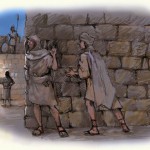Congregation Beth Mordecai
Congregation Beth Mordecai
An inclusive congregation affiliated with the Conservative Movement.
Your Jewish Home for the Soul!
An inclusive congregation affiliated with the Conservative Movement.
Your Jewish Home for the Soul!
April 27, 2015 By bethmordecai no comments.
 Dear Hevreh,
One reason I love Hebrew is because its words can have very different, if not opposing, meanings. One example is the term "lev" (לב) which is often translated as "heart" in verses like Deuteronomy 6:5 ("You shall love your God with all your heart, with all your soul, and with all your might"). But as some scholars explain, the term "lev" should not be translated as heart but rather as "mind" or "consciousness." For instance, Proverbs 14:10 is often translated as "the heart ("lev") knows its own bitterness." But how can the heart -- the seat of emotion and passion -- be self aware enough to understand itself? Rather, it makes more sense to understand[...]
Dear Hevreh,
One reason I love Hebrew is because its words can have very different, if not opposing, meanings. One example is the term "lev" (לב) which is often translated as "heart" in verses like Deuteronomy 6:5 ("You shall love your God with all your heart, with all your soul, and with all your might"). But as some scholars explain, the term "lev" should not be translated as heart but rather as "mind" or "consciousness." For instance, Proverbs 14:10 is often translated as "the heart ("lev") knows its own bitterness." But how can the heart -- the seat of emotion and passion -- be self aware enough to understand itself? Rather, it makes more sense to understand[...]
Category : Ari-archive Tag : adult education Burton Visotzky heart Jewish-Muslim Lev Mind rabbi rabbi's journal shabbat by the sea
October 24, 2014 By bethmordecai no comments.
 Parashat Noah Triennial II (2014/5775) -- God's Heart
In this week's Torah portion, God uses a flood to destroy all living beings except for Noah and all of the creatures stowed safely in his ark. Afterwards God resolves to never again destroy humanity through a flood, but God's decision only comes about after "God spoke to God's heart" (Genesis 8:21). Is it possible for God to physically have a heart? If so (or even if it's a metaphor) what is significant about God speaking to God's heart and can it teach human beings something about our own hearts?
Join us for this fascinating class as we learn about God's heart and the gift of our[...]
Parashat Noah Triennial II (2014/5775) -- God's Heart
In this week's Torah portion, God uses a flood to destroy all living beings except for Noah and all of the creatures stowed safely in his ark. Afterwards God resolves to never again destroy humanity through a flood, but God's decision only comes about after "God spoke to God's heart" (Genesis 8:21). Is it possible for God to physically have a heart? If so (or even if it's a metaphor) what is significant about God speaking to God's heart and can it teach human beings something about our own hearts?
Join us for this fascinating class as we learn about God's heart and the gift of our[...]
Category : Online Learning Online Parashah Class Tag : acceptance destruction God God's love endures forever heart humanity Noah online learning online parashah class physical rainbow sacrifices נח
June 13, 2014 By bethmordecai no comments.
 Parashat Sh’lah L’kha: The Religious Value of Doubting What You See and Desire
In this week’s Torah portion we read the stories of twelve leaders of Israel who are commanded to “spy” (la-tur) the land of Canaan (Numbers 13:2). Yet at the end of the Torah portion, the root t-u-r that was used earlier for the positive command “to spy” is used here as the negative command for the Israelites to “not follow (v’lo taturu) what they feel in their hearts and what they see with their eyes (Numbers 15:39). What can we learn from the juxtaposition of different meanings for this same root? Why[...]
Parashat Sh’lah L’kha: The Religious Value of Doubting What You See and Desire
In this week’s Torah portion we read the stories of twelve leaders of Israel who are commanded to “spy” (la-tur) the land of Canaan (Numbers 13:2). Yet at the end of the Torah portion, the root t-u-r that was used earlier for the positive command “to spy” is used here as the negative command for the Israelites to “not follow (v’lo taturu) what they feel in their hearts and what they see with their eyes (Numbers 15:39). What can we learn from the juxtaposition of different meanings for this same root? Why[...]
Category : Online Learning Online Parashah Class Tag : desire doubt eyes God heart online learning online parashah class rashbam rashi see shelach lecha shelach lekha shelah lekha shelakh lekha sotah spies talmud tzitzit weekly torah portion